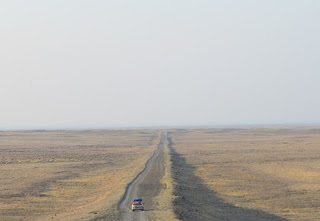Temperatures in the Middle East are warming twice as fast as the rest of the world. Experts say the region is on the verge of doomsday if it still turns a blind eye to the impacts of climate change.
The situation will only get worse if leaders in the region turn a blind eye to the impacts of climate change. Quoted from The Guardian, Sunday (10/31/2021) experts predict that if even more dire predictions prove true, by the end of this century, Makkah may be uninhabitable. Performing the pilgrimage in the summer will be very dangerous, it can even cause havoc.
If you still deny, please consider the following facts. Northern Oman has just been hit by Cyclone Shaheen, the first tropical cyclone to reach the Gulf. Around Basra in southern Iraq this summer, exposure to temperatures of up to 50 degrees Celsius at the power grid led to persistent blackouts.
Kuwait broke the record for the hottest day in 2016 with temperatures reaching 53.6 degrees Celsius. Flash floods occurred in Jeddah, and more recently Makkah, while across Saudi Arabia the average temperature has risen by 2%, and the maximum temperature by 2.5%. In Qatar, the country with the highest per capita carbon emissions in the world and the largest producer of liquefied gas, the open space is already air-conditioned.
Then in Tehran, air pollution kills 4,000 people every year, while in the southwestern province of Khuzestan residents block roads and burn tires to protest a drought caused by a combination of mismanagement, western sanctions and deadly heat.
Lastly, experts estimate the climate crisis in the United Arab Emirates to cost USD 8.2 billion a year in rising healthcare costs. The salinity of the Gulf, caused by the proliferation of desalination plants, has increased by 20%, with all possible impacts on marine life and biodiversity.
The great Middle East tract would resemble the desert in Ethiopia's Afar, and the normally gleaming Gulf coast towns could at the end of the century be submerged as the waters rose. The end is near.
Calamity of Oil
"This is a very difficult issue because the interests of the ruling elite conflict with the interests of citizens. The ruling elite all depend on the oil chain for the survival of their regimes," said Jim Krane, an energy research analyst at the Rice University Baker Institute in Houston, US.
"They need the oil business to stay alive to keep them in power. Their system is based on sustainable oil leases, but at the end of the day, people's long-term interest is with a livable climate."
Zeina Khalil Hajj, founder of Greenpeace in the Middle East, said the region was under double pressure. As energy demand changes, regions that are fundamentally dependent on fossil fuels, oil and carbon for their economic survival cannot continue this dependence.
"There will be no market for their oil. But when the climate changes, it has the extra task of shifting for its own survival. Extreme weather is changing people's lives on an everyday level. There is no choice but to go green," he said.
In fact, the region had been told at least a decade earlier that it needed to transition away from oil. The bay has the three elements needed to make the switch to renewable energy: capital, plenty of sunshine, and ample vacant land. But in fact, the Gulf countries are still very dependent on oil and gas exports.


